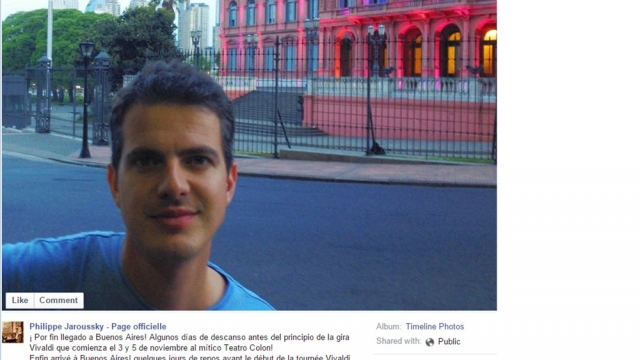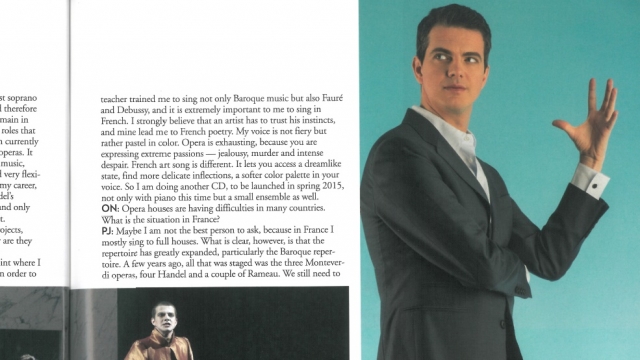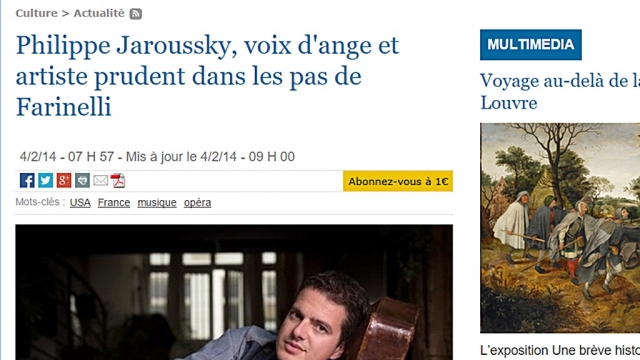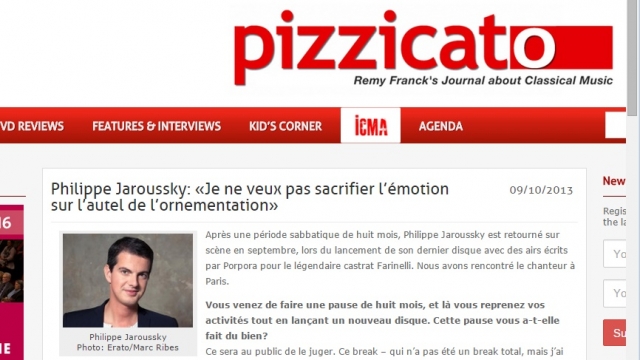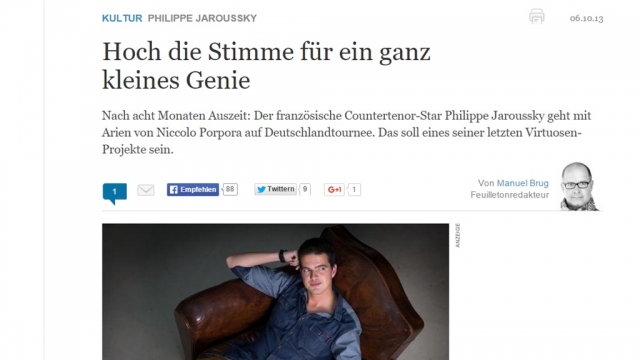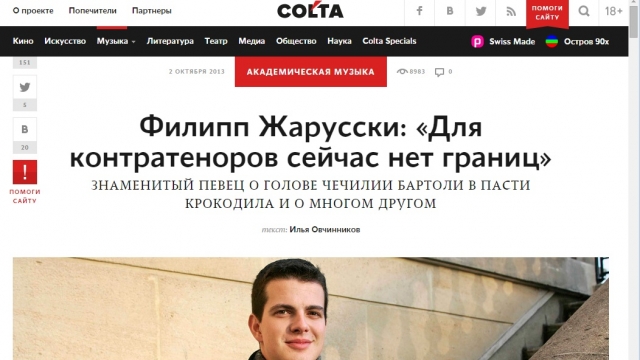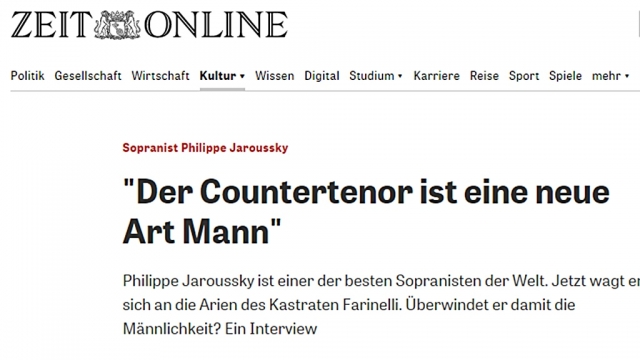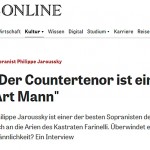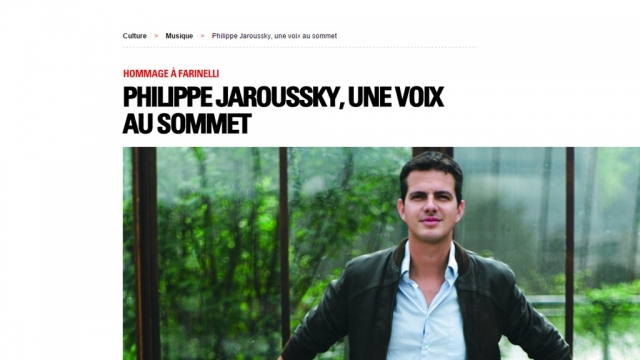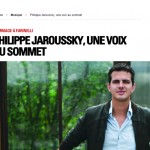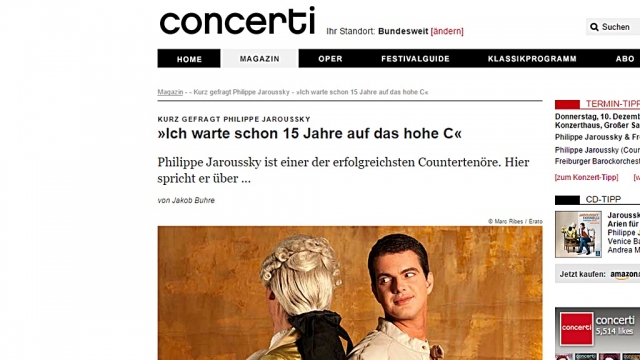2013-10-01, Zeit Online, by Rabea Weihser
ZEIT ONLINE: Macht man sich als Countertenor ganz von allein Gedanken um ein männliches Rollenbild?
Jaroussky: Ein Countertenor zu sein ist eine Art auszudrücken, was ein Mann sein kann. Er kann seine weibliche Seite entdecken und eine Vielzahl von Gefühlen ausdrücken. Diese romantische Idee vom mutigen Helden, der in den Krieg zieht, ist längst abgelöst. Ich kann ein Mann sein und hoch singen. Wo ist das Problem? Ich kann genauso eine Frau sein und arbeiten gehen.
Source/Read more: [x]
Disclaimer: The following is not a professional translation. We believe its publication fulfills the requirements of “fair use,” discussion and study. No infringement of copyright is intended.
“A countertenor is a new kind of man”
Philippe Jaroussky is one of the best sopranos in the world. Now he ventures on the arias of the castrato Farinelli. With this, does he overcome manliness? [this is awkward to translate to English. What is meant by manliness (as I see it), is an outdated concept of masculinity.]
Philippe Jaroussky was born in 1978 in Maisons-Laffitte, France. He describes himself as “mezzo with the colour of a soprano.”
ZEIT ONLINE: Monsieur Jaroussky , you’ve just released an album with the arias of the great Farinelli. We know his story from the movie – the absolute cliché when it comes to opera-castratos. Isn’t this a little too obvious?
Philippe Jaroussky: I was always afraid to record a Farinelli programme. But I’ve noticed that his repertoire fits my voice quite well. [Via this repertoire,]I thought it was a good idea to discover a different composer. I’m using the name Farinelli to tell something about Nicola Porpora. And what I wanted to show with this project is that castrato voices aren’t miracles. The singers had to work hard.
ZEIT ONLINE: In which way does your voice differ from Farinelli’s?
Jaroussky: Some critics say: His voice doesn’t sound like Farinelli at all.”
ZEIT ONLINE: Who knows for sure? Carlo Broschi, known as Farinelli, died in 1782.
Jaroussky: We know a lot about the qualities of his voice. He could sing a very high soprano and – in the same opera – an aria for contralto. And he used his chest voice far more often than I do. I cannot sing the entire repertoire of Farinelli’s. However, in Porpora’s music I have found many very touching arias and that’s the most important thing about this project: I want the audience to feel what Porpora felt for Farinelli.
ZEIT ONLINE: Porpora wrote the most virtuosic arias for Farinelli. How did you realize them?
Jaroussky: It’s gymnastics. To sing this music, you have to train, just as for as Verdi, Puccini and Wagner. You have to sing these high sections [in German, it is unclear if he means the whole aria or just the specific part of it] 50 times a day in order to survive on the stage.
ZEIT ONLINE: There is hardly another genre of classical music that is equally focused on the artistry of the performer. You step in front of the audience, and show how to overcome human and also male limits. At times, do you feel like a circus horse that’s showing off a few tricks?
Jaroussky: Naturally, during the concert, the audience most reacts to the virtuosic arias. People shout, they go mad. But when I’m talking to them later, they are talking about the emotional arias, not of the virtuosic ones.
ZEIT ONLINE: These are effects just in big pop music.
Jaroussky: Yes, and people have a strange relationship to castrato operas. Of course, they don’t want to see real castratos any more, that’s passé. But nonetheless, there’s this desire [“Sehnsucht” is such a beautiful German word. Hard to translate] to hear them again. These concerts with castrato repertoire are something very special.
ZEIT ONLINE: One could also say, the castrato opera was the first art form based on hormonal doping. By castration, the larynx and the vocal chords remained childlike, while the rest of the body continued to grow. Farinelli and his colleagues were rather tall, after all, had little heads on top of delicate bodies, narrow hips and wide chests.
Jaroussky: The hormonal imbalance turned them into monsters. The comparison with athletes who take hormones to pump up their muscles fits somehow. On stage, the castrati were treated like gods – in real life, they were treated like a doormat. They needed all these feathers and costumes, to gain themselves respect. Very dramatic with all that makeup. They were caught up in an artificial world; their life only happened on stage. Most castrati died quickly after they ceased to sing.
ZEIT ONLINE: Especially love duets between a high male voice and a soprano can often be irritating, because one cannot get to match the visual with the acoustic impression. On the other hand, there can hardly be a more appropriate analogy of intimacy than two lovers singing around each other in close third intervals.
Jaroussky: That’s right. There is this fantastic duet at the end of L’ Incoronazione di Poppea by Monteverdi…
ZEIT ONLINE: Emperor Nero sings mezzo, and his mistress Poppea soprano.
Jaroussky: And the two are always together very close. There are many productions of Poppea with tenor and soprano, and it renders an altogether different impression then.
ZEIT ONLINE: As a countertenor, does it come natural to give more thought than average to a male role models? [literally: Männliches Rollenbild is the image that others and oneself have of what ‘male’ might actually mean or imply.]
Jaroussky: To be a countertenor is one way to express what a man can be. He can discover his feminine side and express a variety of feelings. This romantic idea of the brave hero who goes to war is long a thing of the past. I can be a man and sing high. Where’s the problem? Equally, I can be a woman and go to work.
ZEIT ONLINE: It is said that we were in a post- gender era. Do you see any connection to the success of countertenors there?
Jaroussky: Of course. And there’s a whole new school, many young colleagues. A few of them are just as good as female mezzo-sopranos. Perhaps this sounds a little presumptuous, but I think that most from the new school of male sopranos have heard me. I think in the past ten years, I have contributed to direct the voice of countertenors in a different direction. Not only into the alto, but into the mezzo- soprano and soprano Fach. Today I listen to singers who have a greater vocal range than I do. A few years ago, this wasn’t the case.
ZEIT ONLINE: Who were your role models?
Jaroussky: We have to thank like Alfred Deller. Back then, they emerged out of nowhere and decided to sing a repertoire that no one was interested in. When I started , I listened to Andreas Scholl, David Daniels , James Bowman. And I never would have thought, but it’s really easier to sing when you have them as reference.
ZEIT ONLINE: Has the audience changed as well?
Jaroussky: Yes, for them it doesn’t suffice anymore just to listen to a countertenor. They already heard many. He has to sing with perfect intonation and with a strong voice. At the moment, there is a competition amongst countertenors, different colours of voices and different personalities. This is great. Some are giving their best to church music. Others have developed a Belcanto technique.
ZEIT ONLINE: And where is your place ? Forever in Baroque opera?
Jaroussky: I paused for eight months, thinking about what I wanted to sing in the future. This Farinelli project could be my last from the castrato repertoire. I’m not quite so athletic; sometimes I have no desire to exercise. That’s one reason why I want to sing something else. There are so many interesting parts in sacred music, by Bach, Purcell, or Dowland. There it isn’t about virtuosity; there it is all about how to interpret a piece of poetry. For me, this is getting more important.

